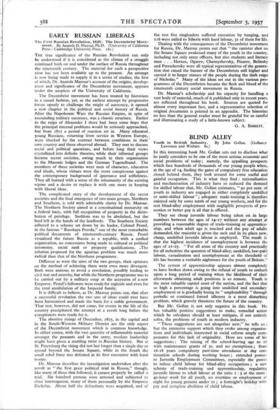EARLY RUSSIAN LIBERALS
THE true significance of the Russian Revolution can only be understood if it is considered as the climax of a struggle continued both on and under the surface of Russia throughout the nineteenth century. The material for such a perspective view has not been available up to the present. An attempt is now being made to supply it in a series of studies, the first of which, Dr. Anatole Mazour's account of the origins, develop- ment and significance of the Decembrist movement, appears under the auspices of the University of California.
The Decembrist movement has been treated by historians in a casual fashion, yet, as the earliest attempt by progressive forces openly to challenge the might of autocracy, it opened a new chapter in the political and social history of Russia. After the Napoleonic Wars the Russian Empire, in spite of, resounding military successes, was a chaotic structure. Earlier in the reign of Alexander I there had been some hope that the principal internal problems would be seriously approached, but from 18 is a period of reaction set in. Many educated, young Russians, returning from service in Western Europe, I were shocked by the contrast between conditions in their ' own country and those observed abroad. They met to discuss social and political questions, and before long their views crystallized into definite theories, while their informal groups became secret societies, owing much in their organisation to the Masonic lodges and the German Tugendbund. The members of these societies were men of character, education and ideals, whose virtues were the more conspicuous against the contemporary background of ignorance and selfishness. They all burned with a sense of the inhumanity of the existing regime and a desire to replace it with one more in keeping with liberal ideas.
' The complicated story of the development of the secret societies and the final emergence of two main groups, Northern and Southern, is told with admirable clarity by Dr. Mazour. The Northern Society aimed at a constitutional monarchy on a.federal basis, with full recognition of property in the distri- bution of privilege. Serfdom was to be abolished, but the land left in the hands of the landlords. The Southern Society adhered to a scheme set down by its leader, Colonel Pestel, in the famous " Russkaya Pravda," one of the most remarkable political documents of nineteenth-century Russia. Pestel visualised the future Russia as a republic, with a unified organisation, no concessions being made to cultural or political autonomy, social rank or property qualifications. The solution proposed for the agrarian problem was much more radical than that of the Northern programme.
Different as were the aims of the two groups, their opinions on the method of achieving them were even more divergent. Both were anxious to avoid a revolution, possibly leading to civil war and anarchy, but while the Northern programme was to to carried out by a military coup at the accession of a new Emperor, Pestel's followers were ready for regicide and even for the total annihilation of the Imperial family.
It is difficult to believe, as Dr. Mazour points out, that after a successful revolution the two sets of ideas could ever have been harmonised and made the basis for a stable government. That test, however, did not come, for events in the life of the country precipitated the attempt at a revolt long before the conspirators were ready for it.
The abortive risings of December, 1825, in the capital and in the South-Western Military District are the only aspect of the Decembrist movement which is common knowledge. In either centre, with the vast quantity of inflammable material amongst the peasants and in the army, resolute leadership might have given a startling twist to .Russian history. But at St. Petersburg the rising did not last longer than a single day or spread beyond the Senate Square, while in the South the small rebel force was defeated at its first encounter with loyal troops.
Dr: Mazour describes the investigation undertaken after the revolt as " the first great political trial in Russia," though, like many of those that followed, it cannot properly be called a trial. Six hundred persons were arrested and subjected to close interrogation, many of them personally by the Emperor Nicholas. About half the defendants were- acquitted, and of the rest five ringleaders suffered execution by hanging, and 116 were exiled to Siberia with hard labour, 51 of them for life.
Dealing with the consequences of the Decembrist movement for Russia, Dr. Mazour points out that " the canister shot on the Senate Square awakened many of the youth in the country, including not only army officers, but also students and literary men . . . Herzen, Ogarev, Chernyshevsky, Pisarev, Belinsky and Petrashevsky were all typical representatives of the genera- tion that raised the banner of the Decembrists still higher and carried it to larger masses of the people during the dark reign of Nicholas." Many of the ideas set out in the various pro- grammes of the Decembrists became the flesh and blood of the nineteenth century social movement in Russia.
Dr. Mazour's scholarship and his capacity for handling a vast body of material, much of it published only in recent years, are reflected throughout his book. Sources are quoted for almost every important fact, and a representative selection of original documents is printed in an appendix. The historian no less than the general reader must be grateful for so careful and illuminating a study of a little-known subject.
G. A. BiaxErr.










































 Previous page
Previous page